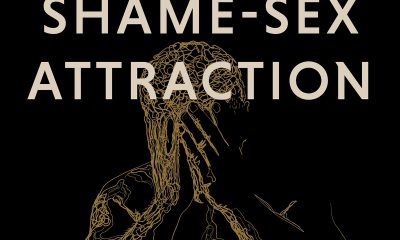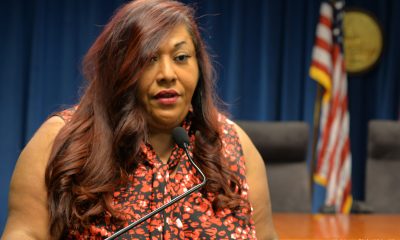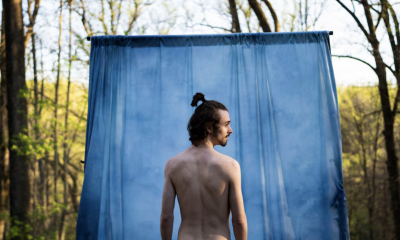Theater
Two queer artists ready to debut new operas at Kennedy Center
Works by JL Marlor, Omar Najmi part of American Opera Initiative

American Opera Initiative
Kennedy Center Terrace Theater
Jan. 18, 7 p.m. and 9 p.m.
$25.00 – $39.00
Kennedy-center.org
For those who find traditional opera off-putting or mired in the past, there’s the American Opera Initiative (AOI). Now in its 12th season, the Washington National Opera’s well-known program pairs composers and librettists who under mentorship spend months collaborating on new work, culminating with the premiere of three 20-minute operas.
Included in this year’s exciting group are queer artists JL Marlor and Omar Najmi. While these multi-taskers lend their composition talents to AOI, they are also performers and arts administrators. Marlor’s bio includes electric guitarist, and performer (she fronts the celebrated indie rock band Tenderheart Bitches), and Najmi divides most of his time writing music and performing as an operatic tenor.
Marlor and librettist Claire Fuyuko Bierman’s “Cry, Wolf” is a short yet probing opera about three males (a late teen and two college age) who are navigating some dark internet ideologies. The work explores how the red-pilled manosphere pipeline serves as spaces of community for some people.
“To me it’s a very timely piece inspired by an outlook that has consequences in the real world.” She adds, “We’ve heard a lot about how angry incels [involuntary celibates] think about women. I want to hear what incels think about themselves.”
While Marlor tends to gravitate toward more serious opera pieces, Fuyuko Bierman, whose background includes standup, tends toward humor.
“I think this work brought out the best in both of us. The libretto feels like a comedy until suddenly it doesn’t.”
Marlor was introduced to opera through osmosis. At her gay uncles’ house there was always music – usually Maria Callas or Beverly Sills. She appreciated grand opera but not with the same ardor of true buffs. But her relationship with opera changed dramatically while attending Smith College.
“I was lucky enough to have Kate Soper as my first composition teacher and saw her opera ‘Here Be Sirens’ as my first piece of modern opera. I was totally hooked.”
Originally from picturesque Beverly, Mass., Marlor now lives in Brooklyn with her partner and their very senior dog. For Marlor, coming out at 25 in 2017 wasn’t entirely smooth, but finding support among the many queer women in the world of classical music helped. And more recently, AOI has bolstered her confidence in continuing a career in the arts, she says.
Najmi and librettist Christine Evans’ opera is titled “Mud Girl.” Set against a post-apocalyptic, climate-affected world, it’s the story of a mother, daughter, and the daughter’s child Poly, created from toxic detritus, trying to navigate relationships.
“Most people go into opera without having had a ton of exposure. Often through musical theater or choir,” says Najmi, 37. In his case, he was pursuing a BFA in musical theater at Ithaca College. After an unanticipated internal transfer to the School of Music, where he transitioned from baritone to young gifted tenor, his interest veered toward opera.
While enjoying a performance career, he wrote his first opera on a whim. “And now,” he says “composition is my creative passion. Singing is more like a trade or sport. I love the action of doing it and practicing.”
In one of his recent operas, “Jo Dooba So Paar,” Najmi, who is half Pakistani American, draws specifically from personal experience, exploring how queer and Muslim don’t necessarily need to be conflicting identities. And while he grew up in liberal Boston in a secular environment, he still had insights into what it means to exist in two worlds. It’s a story he wanted to tell.
On a broader level, he says coming of age in the 1990s and aughts, on the cusp of homosexuality becoming normalized and accepted, created certain angsts. Today, his artist’s voice is drawn to the sentimentality that comes with unrequited longing.
What’s more, Najmi collaborates with his husband Brendon Shapiro. In 2022, the Boston-based couple co-founded Catalyst New Music, an organization dedicated to fostering, developing, and producing new works.
AOI’s three 20-minute operas will be led by conductor George Manahan and performed by Cafritz Young Artists on Jan. 18, at 7 p.m. and 9 p.m. in the Kennedy Center Terrace Theater.
Following their world premiere at the Kennedy Center, the three operas will travel to New York City in a co-presentation with the Kaufman Music Center. The Jan. 23 performance will mark AOI’s first appearance in New York City.
Theater
Theatre Prometheus spreads queer joy with ‘Galatea’
Two girls dressed as boys who find love despite the odds

‘Galatea’
Through May 10
Theatre Prometheus
Montgomery College Cultural Arts Center
7995 Georgia Ave, Silver Spring, Md.
$27
Theatreprometheus.org
In a timely move, Theatre Prometheus thought it would be a beneficial thing to spread a little queer joy. And since the company’s mission includes engaging audiences and artists in queer and feminist art, there was nothing to stop them.
Co-artistic directors Tracey Erbacher and Lauren Patton Villegas, both queer, agree they’ve found that joy in John Lyly’s “Galatea,” an Elizabethan-era comedy about Galatea and Phillida, two girls dressed as boys who find love despite some rather slim odds.
Now playing at Montgomery College Cultural Arts Center on the Takoma Park/Silver Spring campus, the upbeat offering is a mix of contemporary and period, and strives to make audiences happy. Galatea’s cast includes Amber Coleman and Cate Ginsberg as the besotted pair.
Erbacher, also the production’s director, adds “queer joy is something that I prioritized in casting actors and interviewing production people. I asked them what it means to them, and resoundingly the reply — from both them and the play — is that queer joy is the freedom to be yourself without having to think about it.
“Galatea” was first brought to Prometheus’s attention by Caitlin Partridge, the company’s literary director. Erbacher recalls, “she strongly suggested I read this very queer play. I read it and fell absolutely in love. And because it’s a comedy — I really like directing comedy — I knew that I could lean into that while not neglecting its universal themes of young love.”
Villegas, who’s not ordinarily drawn to the classics, was also instantly smitten with Galatea.
“Usually with classics, the language doesn’t jump out at me the way modern works do,” she says. “But not so with ‘Galatea.’ The first time I heard it read aloud, I found it easy to follow and entirely accessible in the best way.”
Whether Lyly deliberately wrote a queer play isn’t known. What’s definitely known is the play was written with an all-boy performing troupe in mind; that’s partly why there are so many young female roles, the parts 10-year-old boys were playing at the time.
There’s not a lot known about Lyly’s personal life, mostly because he wasn’t wildly famous. What’s known about the times is that there wasn’t a concept of “gay,” but there were sodomy laws regarding homosexual activity in England geared toward men having sex with men; it was all very phallocentric, Erbacher says.
She categorically adds, “Women’s sexuality wasn’t considered in the equation. In fact, it was often asked whether women were even capable of having sex with other women. It just was not part of the conversation. If there wasn’t a dick involved it didn’t count.
“Perhaps that’s how the playwright got around it. If there were two male characters in the play he could not have done it.”
Prometheus has done adaptations of ancient myths and some classics, but in this case it’s very faithful to the original text. Other than some cuts winnowing the work down to 90 minutes, “Galatea” is pretty much exactly as Lyly wrote it.
And that includes, “girls dressed as boys who fall in love thinking girls are boys,” says Erbacher. “And then they start to clock things: ‘I think he is as I am.’ And then they don’t care if the object of their affection is a boy or a girl, the quintessential bisexual iconic line.”
And without spoiling a thing, the director teases, “the ending is even queerer than the rest of the play.”
Erbacher and Villegas have worked together since Prometheus’s inception 11 years ago. More recently, they became co-artistic directors, splitting the work in myriad ways. It’s a good fit: They share values but not identical artistic sensibilities allow them to exchange objective feedback.
In past seasons, the collaborative pair have produced an all-women production of “Macbeth” and a queered take on [gay] “Cymbeline,” recreating it as a lesbian love story. And when roles aren’t specifically defined male or female, they take the best actor for the part.
With Galatea, Prometheus lightens the current mood. Erbacher says, “the hard stuff is important but exhausting. We deserve a queer rom-com, a romantic sweeping story that’s not focused on how hard it is to be queer, but rather the joy of it.”
Theater
Timely comedy ‘Fake It’ focuses on Native American themes
Arena Stage production features two out actors

‘Fake It Until You Make It’
Through May 4
Arena Stage, 1101 Sixth St., S.W.
Tickets start at $59
Arenastage.org
A farce requires teamwork. And Larissa FastHorse’s “Fake It Until You Make It” now at Arena Stage is no exception.
The timely comedy focuses on Native American nonprofits fractiously housed in a shared space. Friction rises when rivals River (Amy Brenneman), a white woman operating in the Indigenous world, goes up against the more authentic Wynona (Shyla Lefner) to win a lucrative Native-funded grant.
While Brenneman (best known for TV’s Judging Amy) is undeniably a big draw, it takes a group collaboration to hit marks, land jokes, and pull off the well-executed physical comedy including all those carefully timed door slams.
As members of the six-person “Fake It” cast, Brandon Delsid and Eric Stanton Betts, both out actors of partly indigenous ancestry, contribute to the mayhem. Respectively, Delsid and Betts play Krys and Mark, a pair of two-spirited Native Americans who meet farcically cute and enjoy one of the play’s more satisfying arcs.
For Krys, every attractive man is a potential next fling, but when Mark, handsome and relatively reserved, arrives on the scene, it’s something entirely different.
Both onstage and sometimes off, Betts plays the straight man to Delsid’s waggishness. But when it comes down to real life business, the friends are on the same page: not only are the L.A.-based, up-and-coming actors intensely serious about their film and stage careers, but they’re also particularly engaged in the themes of Indigenous People found in “Fake It.”
On a recent Wednesday following a matinee and an audience talkback, they were ready for a phone interview.
In establishing whose voice was whose, Delsid clarified with “I’m the one who sounds a little like a Valley girl.”
WASHINGTON BLADE: Brandon, you’ve been with the show since its early work-shopping days in 2022 and through its debut in Los Angeles and now Washington. Have things evolved?
BRANDON DELSID: Definitely. I’ve grown up in the last couple of years and so has my character; it’s hard to know where I end and Kry begins. There’s been a real melding.
Eric and I are both queer, and to get to play these roles that are so human, imperfect, sexy, and interesting is really joyful.
As queer artists you don’t always get the chance to do work like this. So many stories are queer trauma, which is incredibly important, but it’s liberating to feel joy and ride it off into the sunset, which, without revealing too much, is kind of what we get to do.
BLADE: There’s some race shifting in “Fake It” particularly with regard to “pretendian” (a pejorative term describing a person who has falsely claimed Indigenous status).
ERIC STANTON BETTS: The last few years I’ve been on a journey with my cultural identity and place in the world. I’m a mixed BIPOC artist, my dad is Black and Native American by way of the Cherokee tribe and my mom is white.
Since 2020, I’ve tried to figure out where I belong in this cultural history that I haven’t had a tie to throughout my life; it’s gratifying to find my way back to my indigeneity and be welcomed.
In the play, race shifting is introduced through farce. But it’s never in a disrespectful way; it’s never mocked or done in a way to take away from others. The playwright parallels race shifting with gender fluidity.
DELSID: But in life, there are people posing as Indigenous, actively taking grants, and the play goes there, we don’t hold back. Larissa, our playwright, has made it clear that she’s not trying to figure it out for us. With that in mind, we hope people leave the theater interested and curious to learn more.
BLADE: Mark arrives kind of the middle of some crazy drama, bringing along a jolt of romance.
BETTS: Yeah, when I show up, we’re all sort of shot out of a cannon, struggling to keep up with the initial lie.
DESLID: A very gay cannon.
BLADE: What’s up next for you two?
BETTS: Both Brandon and I are up for the same part in a TV pilot, so one of us may be getting some very good news. I also have a Tyler Perry film coming out soon [he plays a model, not an unfamiliar gig for Betts].
DELSID: Coming up, I have a recurring part on HBO’s “The Rehearsal,” and a supporting part in “June and John,” a John Besson film. But doing “Fake It Until You Make It” in L.A. and now D.C. has been a special time in our lives. It’s 23/7 togetherness. There’s that hour for sleep.
Theater
‘Bad Books’ a timely look at censorship in local library
Influencer vs. conservative parent in Round House production

‘Bad Books’
Through May 4
Round House Theatre
4545 East-West Highway
Bethesda, Md.
Tickets start at $43
Roundhousetheatre.org
While a library might seem an unlikely place for a heated contretemps, it’s exactly the spot where adults go when they’re itching to battle out what books minors might be allowed to read.
In Sharyn Rothstein’s “Bad Books,” two women, The Mother (out actor Holly Twyford) and The Librarian (Kate Eastwood Norris), swiftly become mired in a quarrel that comes with some weighty repercussions.
The Mother is a popular conservative influencer on a mission. She’s furious that the local library has overstepped its bounds and she blames The Librarian, a woman who adheres to the “it takes a village” method of child rearing and is dedicated to the young people who approach her reference desk.
There’s some background. It seems The Librarian who dresses young (tight jackets and Doc Martens) and curses a blue streak, forged a friendship with Jeremy, a teenage library regular.
While the details are a bit hazy, it seems the troubled Jeremy confided in The Librarian regarding some personal issues. In return, she suggested a helpful book – Boob Juice.
Unsurprisingly, based solely on its title, the book has thrown The Mother into a pique of outrage. After finding Boob Juice in her son’s bedroom, she made a beeline to the library; and not incidentally, The Mother hasn’t read the recommended work and has no plans to do so.
Set in a suburb with lax gun laws, the story explores facets of division and conciliation. The Mother insists she isn’t so much about banning books as she is keeping some books away from young people until they’ve obtained parental approval.
“Bad Books” is performed in the round. Built on a rotating stage, Meghan Raham’s set is simple, pleasingly serviceable, and easily transforms from the library into a small corporate office, and later the assembly room of a church. Overhead floats a circular glass shelf filled with a cache of banned books. Things like a rolling book cart and a goldfish bowl add some flavor to the different locations.
The Mother wasn’t always a popular conservative warrior with an enthusiastic horde of followers.
Her past includes penning a book that later filled her with guilt and regret. She refers to that early questionable literary accomplishment as her bad book. And while over the years, she has persevered to find and destroy each and every printed copy, she hasn’t entirely succeeded.
Norris plays three women who figure meaningfully into the arc of Twyford’s mother character. In addition to The Librarian, Norris is The Manager, a broadly played piece of comic relief, and The Editor, a warm woman who reveals things about Jeremy that his own mother never knew.
Smartly staged by Ryan Rilette, the production is part of a National New Play Network Rolling World Premiere. While Rothstein’s script offers two strong roles (skillfully performed by celebrated actors Twyford and Norris), its ending feels too neatly resolved.
In the past, Twyford and Norris have successfully joined forces for numerous DMV productions including Studio Theatre’s production of David Auburn’s two-hander “Summer, 1976,” the story of a longtime and unlikely friendship between two women who meet as young mothers during the Bicentennial summer.
Though different, both The Librarian and The Mother share a strong and ultimately hopeful relationship with words.
There’s a quote from E.B. White’s classic “Charlotte’s Web” that pops up a couple of times in the briskly paced 80-minute play. Charlotte, the wise spider, says, “with just the right words you can change the world.”
-

 Books4 days ago
Books4 days agoChronicling disastrous effects of ‘conversion therapy’
-

 U.S. Federal Courts3 days ago
U.S. Federal Courts3 days agoSecond federal lawsuit filed against White House passport policy
-

 Opinions3 days ago
Opinions3 days agoWe must show up to WorldPride 2025 in D.C.
-

 District of Columbia3 days ago
District of Columbia3 days agoRuby Corado sentencing postponed for third time













